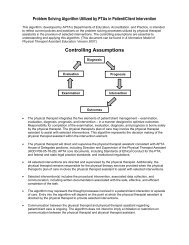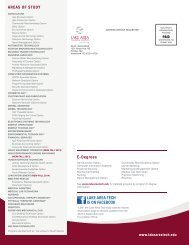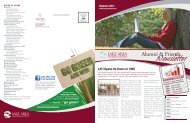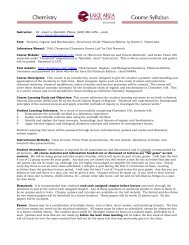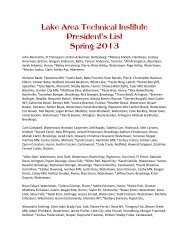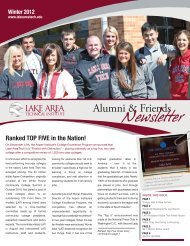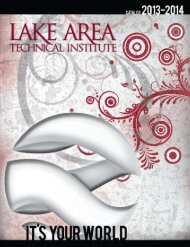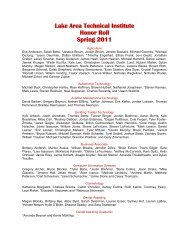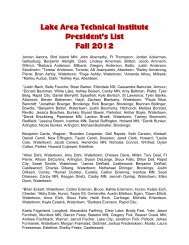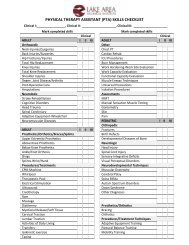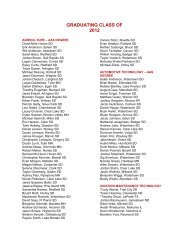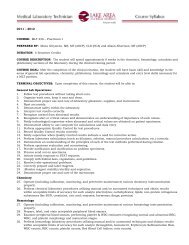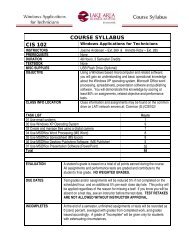Areas Of Study - Lake Area Technical Institute
Areas Of Study - Lake Area Technical Institute
Areas Of Study - Lake Area Technical Institute
Create successful ePaper yourself
Turn your PDF publications into a flip-book with our unique Google optimized e-Paper software.
90<br />
MFR 130<br />
MFR 235<br />
MFR 200<br />
MFR 205<br />
MFR 210<br />
MFR 215<br />
CLINICAL OBSERVATION II<br />
This observation period is designed to meet the requirements<br />
set by the State of South Dakota. This observation/<br />
interaction time will take place in an approved hospital, in<br />
an emergency department, critical care unit, operating room<br />
and an obstetrics unit. Students are encouraged to utilize<br />
the knowledge and skills developed in other classes to use<br />
as much as possible, but most important, students will see<br />
first-hand how sick and injured patients benefit from high<br />
quality medical care and that what they do can and will<br />
make a difference in the lives of others. 5 credits<br />
CERTIFICATIONS<br />
This class consists of three specialized training sessions<br />
taught by outside instructors. The three areas provide<br />
student certification in Adnvanced Cardiac Life Support<br />
(ACLS), Pre-Hospital Trauma Life Support (PHTLS), and<br />
Pediatric Education for Pre-Hospital Professionals (PEPP).<br />
This provides excellent benchmarks to gauge mastery of<br />
knowledge and skills, but also produces credibility for<br />
students and their education through examination and<br />
certification from skilled professionals outside the MFR<br />
staff. 1 1/2 credits<br />
MED/FIRE RESCUE<br />
This class will focus on ambulance operations, incident<br />
management, crime scene awareness and rural EMS. Since<br />
the world around us continues to become increasingly<br />
complex, this class will also address issues related to rescue<br />
awareness and operations, hazardous materials incidents, as<br />
well as responding to terrorist incidents. 1 credit<br />
FIREFIGHTER I<br />
Through classroom and hands-on experience, students<br />
will learn the essentials of firefighting. Beginning with an<br />
overview of the proud history and traditions associated<br />
with the fire service, students will progress into developing<br />
the knowledge and skills associated with behavior, safety<br />
and personal protective equipment. From there, the next<br />
step will involve water supplies and equipment, building<br />
construction, ladders and ropes. At this point, students will<br />
move into rescue operations, forcible entry and ventilation<br />
techniques, fire suppression, firefighter survival, as well as<br />
fire prevention, education and incident planning. Another<br />
area and perhaps the most important subject addressed in<br />
this class, as well as every other class in the program, is the<br />
need for students physical and mental health. 5 credits<br />
HAZARDOUS MATERIALS AWARENESS<br />
AND COMPLIANCE<br />
HAZMAT teams are rapidly becoming a basic component<br />
of every fire department in the United States and the initial<br />
certification required for these teams is the awareness level.<br />
This class is designed to provide the knowledge and skills<br />
required to allow students to function as an integral part<br />
of a HAZMAT team. Subjects covered in the class include<br />
recognition and identification, information resources,<br />
personal protective equipment, protective actions, product<br />
control and air monitoring and terrorism awareness.<br />
3 credits<br />
CLINICAL OBSERVATION III<br />
This observation period is designed to meet the requirements<br />
set by the State of South Dakota. This observation/<br />
interaction time will take place in an approved hospital, in<br />
an emergency department, critical care unit, operating room<br />
and an obstetrics unit. Students are encouraged to utilize<br />
the knowledge and skills developed in other classes to use<br />
as much as possible, but most important, students will see<br />
first-hand how sick and injured patients benefit from high<br />
quality medical care and that what they do can and will<br />
make a difference in the lives of others. 4 credits<br />
MFR 220 FIREFIGHTER II<br />
Through classroom and hands-on experience, students<br />
will learn the essentials of firefighting. Beginning with an<br />
overview of the proud history and traditions associated with<br />
the fire service, students will progress into developing the<br />
knowledge and skills associated with fire behavior, safety<br />
and personal protective equipment. From there, the next<br />
step will involve water supplies and equipment, building<br />
construction, ladders and ropes. At this point, students will<br />
move into rescue operations, forcible entry and ventilation<br />
techniques, fire suppression, firefighter survival, as well as<br />
fire prevention, education and incident planning. Another<br />
area and perhaps the most important subject addressed in<br />
this class, as well as every other class in the program, is the<br />
need for students to actively pursue current and life-long<br />
physical and mental health. 5 credits<br />
MFR 225 AIRPORT RESCUE FIREFIGHTING “ARFF”<br />
Every type of fire has its own characteristics, concerns and<br />
methods of control. Building upon knowledge gained<br />
in Firefighter I and II, students will learn basic airport<br />
awareness, airplane construction and fuels, fire suppression,<br />
occupant protection and extrication, as well as crash truck<br />
operation and tactics. 3 credits<br />
MFR 235 PARAMEDIC PREPARATION<br />
Paramedic Preparation is an introduction into the world<br />
of advanced pre-hospital care. Topics included in the<br />
class include the well being of the paramedic, roles and<br />
responsibilities of the paramedic, illness and injury<br />
prevention, as well as ethical and legal issues related to<br />
modern medicine and pre-hospital care. 2 credits<br />
MFR 240 PROFESSIONAL PORTFOLIO<br />
Students will track their progress in the MFR program by<br />
maintaining a portfolio containing professional certificates<br />
and documentation acquired during the course of the<br />
program. Students will also develop and demonstrate their<br />
problem solving skills in the form of journal entrees that will<br />
be kept in the portfolio. This course will also require students<br />
to complete the on-line version of the FEMA - Incident<br />
Command System, ICS 100, 200, and 700 level classes; for<br />
which they will receive certificates from FEMA. 1 credit<br />
MICR 231 GENERAL MICROBIOLOGY*<br />
<strong>Study</strong> of microorganisms emphasizing structure, metabolism,<br />
dis eas es, disease prevention and cure, immune systems and<br />
microbial ecol o gy. 4 credits *College transferable.<br />
MLT 101 INTRODUCTION TO MEDICAL LABORATORY<br />
Course focuses on laboratory mathematics, discussion and<br />
im ple men ta tion of safety practices, discussion and instruction<br />
in the areas of pro fes sion al ism, ethics, accreditation and<br />
certification. 2 credits<br />
MLT 105 URINALYSIS AND BODY FLUIDS<br />
The study of urinalysis to include terms, physical, chemical<br />
and mi cro scop ic exam, as well as special screening tests<br />
employed. In cludes the study of body fluids such as cerebral<br />
spinal fluid, semen, synovial fluid, amniotic fluid, and fecal<br />
specimens. 3 credits<br />
MLT 115 HEMATOLOGY<br />
The study of blood cells and cell development, recognition<br />
of normal and abnormal cell morphology, alterations present<br />
in disease, studies of anemias and leukemias, platelets and coag<br />
u la tion mechanism and tests employed in the laboratory.<br />
4 cred its



